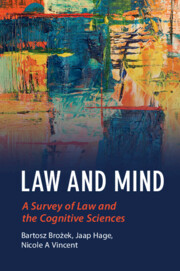Book contents
- Law and Mind
- Law and the Cognitive Sciences
- Law and Mind
- Copyright page
- Contents
- Figures
- Contributors
- Acknowledgements
- 1 Introduction
- I Metatheory and Methodology
- II Ontology and Epistemology
- III Legal Doctrine and Cognitive Sciences
- 11 Private Law and Cognitive Science
- 12 Private Law and Cognitive Science: A Methodological Commentary
- 13 Responsibility, Liability, and Retribution
- 14 Guilt in Criminal Law: Guilt in Us or in the Stars?
- 15 The Insanity Defense
- 16 Thoughts on the Insanity Defence
- IV Evidence
- V Dissenting Opinions
- References
14 - Guilt in Criminal Law: Guilt in Us or in the Stars?
from III - Legal Doctrine and Cognitive Sciences
Published online by Cambridge University Press: 21 April 2021
- Law and Mind
- Law and the Cognitive Sciences
- Law and Mind
- Copyright page
- Contents
- Figures
- Contributors
- Acknowledgements
- 1 Introduction
- I Metatheory and Methodology
- II Ontology and Epistemology
- III Legal Doctrine and Cognitive Sciences
- 11 Private Law and Cognitive Science
- 12 Private Law and Cognitive Science: A Methodological Commentary
- 13 Responsibility, Liability, and Retribution
- 14 Guilt in Criminal Law: Guilt in Us or in the Stars?
- 15 The Insanity Defense
- 16 Thoughts on the Insanity Defence
- IV Evidence
- V Dissenting Opinions
- References
Summary
This article explores the notion of guilt understood as one of the conditions required to attribute criminal liability to a perpetrator of a prohibited act. We narrow our considerations only to the theories developed by continental law scholars. As a guiding schema for our presentation, we take the famous quote from Shakespeare, ‘The fault, dear Brutus, is not in our stars, but in ourselves.’ Our point of departure are the psychological theories that locate guilt in us, therefore explaining it as a perpetrator’s state of mind. With the critiques of this approach, we move to the normative theories which search for guilt outside the agent. Guilt is understood here as a charge that a perpetrator did not act in accordance with their legal obligations. Next, we present the imputative theory, which tries to return from distant stars to a perpetrator in defining what guilt is. In our final remarks, we offer the assessment of guilt as a principle of criminal liability and of its importance to the standard of human rights. Along the way, we also point to various problems that arise on the basis of each one of the discussed theories and that are interesting from the perspective of cognitive science, such as the problems of naïve psychology or the assumption of free will.
- Type
- Chapter
- Information
- Law and MindA Survey of Law and the Cognitive Sciences, pp. 289 - 316Publisher: Cambridge University PressPrint publication year: 2021

